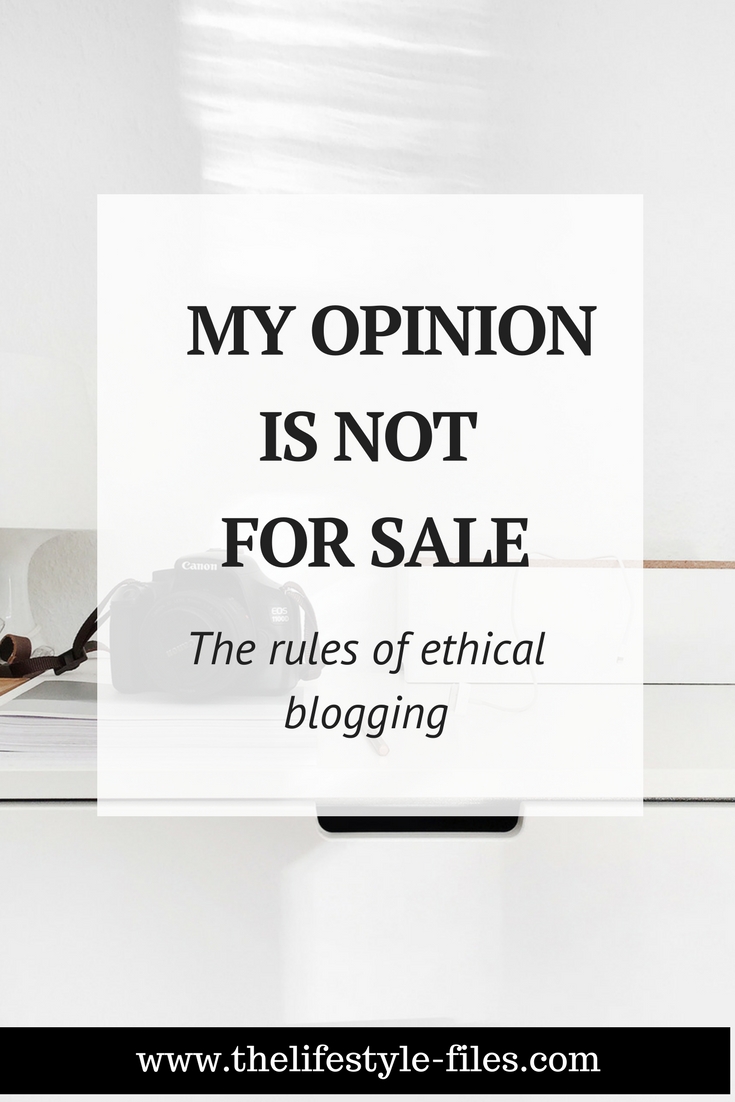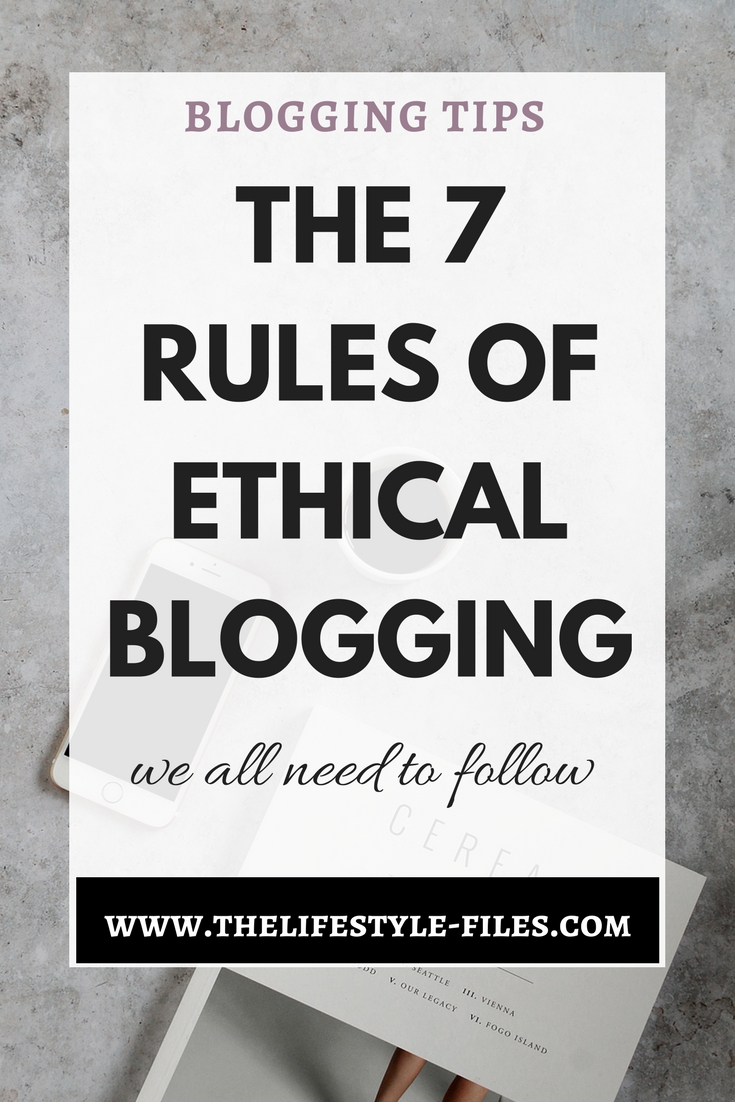
When I first started to think about this blog post, I struggled a lot with the title. I immediately thought about using the term ethical blogging, but I wasn’t sure people would make the association I had in mind. Whenever I see the term ethical blogging or ethical bloggers, it’s usually in the context of conscious consumerism – ethical fashion or ethical lifestyle. And while that is a legitimate association, this is not exactly what I had in mind.
I wanted to write about ethical blogging in an all-encompassing sense. About the written and unwritten, moral and ethical rules or guidelines of blogging. About the way we all, as content creators, no matter how small or big we may be, have a responsibility to shape this industry and shape it for the better.
Blogging is not a totally new concept, but in some respect, it’s still in the early stages. The influence is growing, but with that so does the responsibility.
1 // Organic growth is the only way
It’s actually quite sad how many people still resort to growing their accounts in a dishonest way. Even though there seems to be a strong discussion around fake, bought followers, social media bots, or the infamous follow/unfollow method, a lot of people still disregard these and continue to use less than honest tactics.
Needless to say, this is as far from ethical blogging as it can get.
I know the pressure is real. It’s also sometimes unfair, especially if we see that bloggers who are for sure using these tactics are still getting ahead. But I still think organic growth is the only choice that makes sense. More and more brands and people are realizing these fake methods and I’m sure there will be a big shakeout soon. It takes me exactly 10 seconds to check someone’s stats or Socialblade graph, why do we think brands and readers will not do the same eventually?
Organic growth may be slow, but it means an audience of real people, true supporters, and higher engagement – everything that will eventually make the difference.
Related: A case for slow blogging
2 // Give credit where credit is due
We’re probably all curating content to some level – sharing articles, retweet, reshare, use research, quotes, even pictures. This is an essential feature of the online community, but it must be done with great caution and attentiveness. Ethical bloggers never, ever use something and pretend it is their own work. Moreover, they don’t even make it ambiguous whether what they share is their own work or someone else’s. Give credit where credit is due – link back to the original sources, tag the original creator, use their own resharing tools (retweets or share from their website).
We all make mistakes sometimes. I know I definitely did when I started blogging. I try to take most of my photos, but sometimes life happens or I need a different kind of photo for a special post so I use other photos. I always tried to find the original source using the Google image search function, but if I didn’t find it, I thought it was enough to only credit the website I found the photo on. Now I know, it’s not enough. But this was an honest mistake I learned from.
Ethical blogging is not about perfection or not making mistakes – it’s about learning and always trying to be better.
3 // Draw a thick line between inspiration and copying
It is an art commonplace that no idea is original. I’m a bit on the fence about this one – I think there are still original ideas, but it’s true that a lot of topics and issues have been written about and discussed at one point or another. We’re all standing on the shoulders of people before us. We’re using tropes, symbols, ideas, or common experiences. That doesn’t mean our take on them cannot be original. It’s perfectly fine to be inspired by someone else – but we must draw a line between inspiration and straight out copying.
We are probably all aware of what direct plagiarism is – taking photos or content from someone else and passing them on as our own. It is, of course, wrong and also illegal.
But what’s the deal with general inspiration? Sometimes it can be hard to make a difference where inspiration ends and not so obvious copying starts. Sometimes I really dislike researching topics, because I don’t even want some snippets or sayings getting stuck in my mind and influencing what my own ideas are. I think the ethical guideline here should be:
1. Crediting the source if you’re taking over something or building on a unique idea.
2. Trying to add something unique to the discussion.
4 // #AD
Thankfully, it seems the blogging industry is slowly moving towards stricter rules and greater transparency when it comes to disclosing sponsored and paid for posts, gifted items, and brand partnerships. However, to say that everyone is playing by the rules would not be true – unfortunately. In my experience, a lot of people (influencers as well as brands) are still either not aware of the rules and ethics of disclosing ads or simply choose to ignore it. I, too, have received offers from companies for promoted, but undisclosed content or dofollow links for paid posts. Needless to say, I declined them and I urge everyone to do the same. Why?
- Rules are rules. Consumer protection agencies all over the world are catching up with the influencer industry and realize the enormous marketing and selling power they have as well as the fact that it needs to be regulated, just like traditional advertising and marketing. And if someone’s not playing by the rules, the punishment can be severe – from fines, Google penalties, and ultimately, the loss of reputation and good faith of the audience.
- It’s not worth it. No matter how small the chances of getting caught are (though they are growing fast in my opinion), it’s just simply not worth it.
- It’s simply not right. Influencers have, well, influence. An audience of people who like and trust them. They deserve the truth. They deserve honesty and transparency. They will not punish you for selling things and working with brands if you’re upfront about that because you have probably established a level of trust. Do not betray that.
Usually, rules are determined by your country’s authorities. In the US it’s the FTC (Federal Trade Commission), in the UK it’s the ASA (Advertising Standards Agency). If you’re not sure, try to contact a consumer protection agency and ask for guidelines. It’s always better to be safe than sorry.
Here are some useful materials to consult:
+ Endorsement guide by the FTC
+ .com Disclosures: How to make effective disclosures in digital advertising
+ ASA Recognizing ads: social media
+ Blog Disclosure Statements: Are You Following The Law?
+ A How-To Guide for Properly Disclosing Your Sponsored Posts
5 // Don’t sell a lie
It’s one thing to properly disclose a partnership or an ad. It’s another to truly believe in what you’re selling.
Ethical bloggers know when to say NO. If it’s not in line with your brand, niche, or audience – say NO. If you don’t really use and like the product – say NO. If you wouldn’t recommend it to your family or friends – say NO. No matter how much money you’re saying no to, I guarantee it will be worth it in the long run.
Don’t sell a lie about yourself either. When I started my blog, I, of course, tried to find useful tips and best practices on several aspects of blogging – from social media management to posting guidelines. I saw a LOT of courses, workshops, e-books. And I’m all for researching and even buying educational material – if they are indeed valuable. But it’s difficult to find the ones that are truly useful among the thousands who are trying to sell some kind of expertise. Because I’ve been working in the communications/branding industry for a while, I have some knowledge of what constitutes valuable tips and unfortunately, a lot of these materials fall short on their promises. I’ve seen e-books with the most basic information ever and marketing experts selling Instagram courses when it’s blatantly obvious that they bought followers. For me, this is the epitome of selling a lie. Ethical bloggers will go to great lengths to make sure that what they are selling is actually true, authentic, and valuable. It’s better to wait until what you offer is perfect and unique than trying to sell something that is not.
6 // Community, not consumers
Ethical bloggers view their audiences as a community, and not as a mass of faceless consumers. Adding value will always be the priority for them, even when they partner with brands. A lot of bloggers fall into the trap of losing the connection with their audience after they’ve grown to a particular size. I think no matter the size of our audience or the influencer status, communication should never be one-sided. I know it’s not possible to answer all emails, tweets, questions, and comments, especially if you get hundreds or thousands in a day. But I still have the utmost respect for bloggers who try to react to at least some of that and do not seem like they are unapproachable.
7 // Be aware of the power of your voice
As a blogger, your voice is powerful. Use it well. Inspire, share tips, connect, help others, tell your story, share your art, create communities, support issues, entertain, inform, treat others well.
Please share what ethical blogging means to you!






